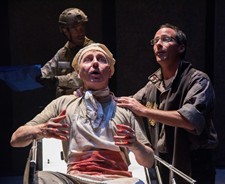|
Pity in History
Theatre Review by David Hurst - July 18, 2017

Steven Dykes and Matt Ball
Photo by Stan Barouh
|
For their 31st repertory season, and their 11th consecutive season in New York City, it should come as no surprise PTP/NYC (Potomac Theatre Project) has included a play by iconoclastic, British playwright Howard Barker. Long a champion of Barker's provocative work, of the 73 mainstage productions PTP/NYC has performed over the last three decades 11 of them have been by Barker, including multiple American premieres (Gertrude: The Cry, The Castle, The Europeans: Struggle to Love, and Gary the Thief), a New York premiere (Judith: A Parting from the Body), a world premiere (Plevna: Meditations on Hatred) and the play widely considered to be his masterpiece (Scenes from an Execution). Through August 6 New Yorkers are being treated to a rarity in Barker's canon, Pity In History, which is receiving its "professional stage premiere" having started life as a teleplay commissioned by the BBC, airing on July 4, 1985.
Pity in History was originally set at the beginning of the English revolution (1642-1651), a civil war that pitted Cromwell's Parliamentarians against King Charles I's Royalists. Tensions ran high about hot-button issues like religion, social class, property and art, and Barker's writing was inspired by Thatcherism and the rejection of political consensus in post WWII Europe. Audiences in 1985 watched the broadcast and saw their politically divided country reflected in the 17th century conflict playing out in Barker's imagination. Today of course, in the dystopian world of Trump and Twitter, the play can't help but reflect recent political events in the United States and Great Britain. Director Richard Romagnoli has set this new stage incarnation of Pity In History in "the present" and in contemporary costumes, but the dialogue (with few exceptions) remains the same as originally presented.

Jonathan Tindle and Christopher Marshall
Photo by Stan Barouh
|
The play is essentially the story of an artist caught in the maelstrom of a chaotic moment in history and his reaction to the chaos swirling about him. In this case, the artist is a mason named Gaukroger played with beautiful restraint by Steven Dykes, attempting to complete the carving of a funeral monument in the crypt of a cathedral with his apprentice Pool, a spot-on Matt Ball, for the widow Venables, a glamorous Kathleen Wise. Upstairs in the cathedral a cadre of soldiers are drilling while the try to ignore the rather loud dying of Murgatroyd, their cook, played with insouciant sarcasm by Jonathan Tindle. Being just a cook Murgatroyd can't understand why God would have allowed him to be shot, but the soldiers hustle him down to the crypt to keep him and his politically incorrect comments out of sight and mind.
Despite the soldier's mantra "God is on our side," events spiral out of control despite the best efforts of their chaplain, Croop, well-played by Christopher Marshall (and the role originally essayed by Alan Rickman in the BBC telefilm), who sounds the only reasonable notes among the military contingency. The voice of reason' in Barker's work falls to Gaukroger who becomes an observer, a philosopher and ultimately a victim as he's forced to watch the soldiers destroy the monument he's labored to complete. Pity In History illuminates the conflict and contradiction that inherently come to light when chaos and art face off against each other. No doubt this is the reason PTP/NYC paired Barker's play with Tom Stoppard's Arcadia for this summer's repertory season. These two monumental playwrights may seem diametrically opposed but these two works share the mingling of idealism, cynicism and fanaticism to expose the eloquent spark of creation that remains ineffable.
Pity in History
Through August 6
The Atlantic Stage 2, 330 West 16th Street between 8th and 9th Avenues
Tickets online and current Performance Schedule: OvationTix
|
